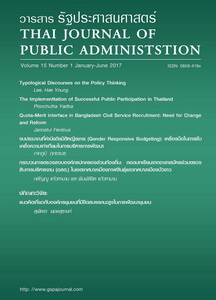Typological Discourses on the Policy Thinking
Keywords:
Policy thinking, statism, policy interventionism, the principle of precursor, the principle of non-division among all beings, the principle of balance, practicalismAbstract
This paper is bounded to ideological discourses by the introduction of a conceptual typology of policy thinking that comprises five classifications: statism, the precursor principle for policy leading to the right or good path, the principle of non-division among all beings, the principle of balance, and practicalism. Such policy thinking can be a theoretical underpinning leading to disciplinary identity, maturity, and practical relevance of policy studies. Statism can be defined by the state leading to righteousness and goodness of policymaking (this is the second type of policy thinking, the principle of precursor) through policy intervention into individuals’ free will and autonomy. These two types of policy thinking interconnect ideologically and theoretically the dialectical or dichotomous divisions between subjective and objective policy analysis and argument, ego and non-ego policy interest, and physical and mental policy causations. This logical argument supports an ideological discourse on the principle of non-division among all beings by employing the oriental philosophies of Madhyamika and Hwa-yen. It demonstrates that the dichotomous approach to policy studies is altogether fallacious because these two ideologies originated and are practised interdependently. The physical and mental causations of policy can be balanced through dynamic shifts in actions taken with regard to competing policy values and arguments between policy process versus space and policy cost versus benefit. Practicalism is bounded to practical wisdom and knowledge by the philosophical deliberation on and understanding of the applications of policy theories in policy practices. However, this article’s arguments for developing policy thinking methodologically demand more comparative studies that conduct philosophical inquiries for practical and scientific justifications.



